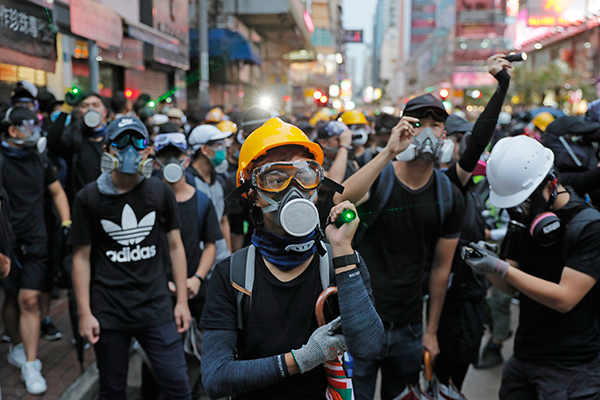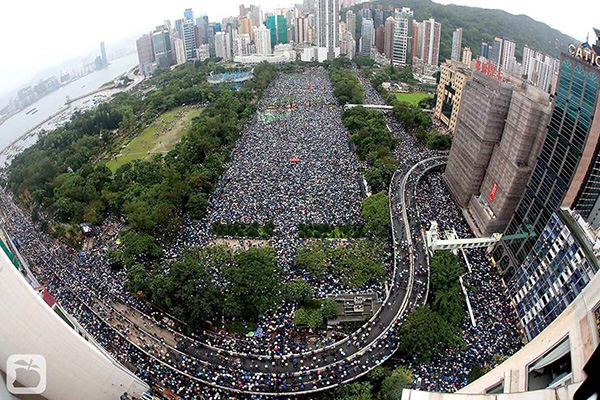The Mass Protests in Hong Kong: Some Key Points of Orientation
| revcom.us
Editors’ Note: We received this contribution late into publication and posting, but feel it is important to share with readers. Please tune into revcom.us for further updates, opinions, and orientation on this.
1) What triggered the summer wave of mass resistance
For the past 10 weeks, Hong Kong has been rocked by massive protests. Huge demonstrations and occupations (including of the main airport), strikes against the local government; and clashes with police and gangs linked to the government. At its height, over a million people (in a city of seven million) may have been involved in the outpourings.
Students and young people initially took to the streets to protest a proposed bill that allows suspects to be extradited—transferred—to the Chinese mainland to stand trial and face far harsher penalties. The protests triggered by the proposed bill soon widened into a larger protest against the local government itself, raising issues of political rights, expression, and dissent. The protests have also given voice to deep discontent over the lack of affordable housing, a growing pollution emergency, and Hong Kong’s enormous inequalities in wealth.
While a range of different class and political forces with their own aims and programs are involved in this rebellion, this movement is righteously seeking to resist the imposition of an even more oppressive regime of control over the lives and futures of the people of Hong Kong.
2) Some essential historical and contemporary facts
Hong Kong was seized from China at gunpoint by Great Britain in 1841. In 1898, the British brokered a 99-year lease of control over Hong Kong. After World War 2, Hong Kong became a cheap-manufacturing hub and a major financial center of Western globalized capitalism. Banks and stock markets facilitated the movement of capital through Asia, and Hong Kong’s ports shipped and re-shipped goods throughout the world.
The People’s Republic of China (PRC) was established in 1949 through a communist revolution that shattered the domination of imperialism over China and broke the back of the oppressive landlord system and foreign-controlled capitalism. A socialist society was created and hundreds of millions took up the cause of forging a society free of exploitation and oppression. But a new capitalist class arose within the structures of the Communist Party and the socialist state. Mao Zedong led millions in the Cultural Revolution to wage struggle to deepen the revolution and prevent the restoration of capitalism. But in 1976, this new capitalist class seized power.
The PRC continues to call itself socialist. But China is a thoroughly and brutally capitalist society—organized around profit and based on exploitation. China is governed by a highly-repressive capitalist ruling class. The regime, however, maintains the veneer of socialism for a number of reasons—including keeping the appearance of links to Mao and the 1949 revolution for legitimacy, and presenting itself as a new kind of power on the world imperialist stage.
In 1997, the British lease over Hong Kong ran out, and China regained control. In the two decades since, Hong Kong has continued to play a vital role as a financial center of world capitalism—while also serving the needs of China’s increasingly globally competitive and expanding capitalism. Most direct foreign investment into China flows through Hong Kong. And much of China’s outbound investment to other parts of the world passes through Hong Kong.
3) A just upsurge in a complex international situation
When Great Britain returned Hong Kong to China in 1997, the PRC granted Hong Kong a small measure of autonomy in its economic and political functioning and legal system. Now the central government is seeking to tighten its political control over Hong Kong, even as the local government is subservient to it. There are a number of reasons that China is putting greater restrictions on Hong Kong’s political fabric. Some have to do with the central government’s concern over the potential for political and social fragmentation in China, and keeping China stable and unified. And this is completely bound up with a defining factor of world economics and politics today: the challenge that China is mounting to U.S. global economic supremacy and intensifying rivalry between the U.S. and China, the world’s two largest capitalist powers.
Hong Kong plays a major, if evolving, role in China’s global economic agenda; and the PRC will not tolerate a Hong Kong that spins out of control.
The local Hong Kong government has responded to the current wave of protests with brutal repression and threats of more repression. Meanwhile, the central government of the People’s Republic of China has made clear through official statements and movements of special military units that it is prepared to step in to quash the protests.
It is very good and fine that the people of Hong Kong are refusing to back off in the face of force and threats of force... and that the protests have increased in size and militancy. And in the face of the fascist Trump/Pence regime seeking to consolidate fascism in the U.S., the resistance and upheaval in Hong Kong is something that people here should learn from.

Protesters beam laser pointers at policemen during the anti-extradition bill protest in Hong Kong Saturday, Aug. 17, 2019. Photo: AP

Photo: @AppleDaily
Get a free email subscription to revcom.us:


